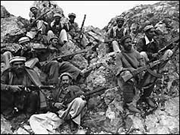 |
| There has been fierce resistance to the Soviet invasion |
| 1980: Afghan leader defends Soviet invasion |
England have
The new president of Afghanistan, Babrak Karmal, has made his first public appearance since the Soviet-backed coup last week.
Speaking in Kabul, Karmal told foreign journalists that Soviet troops are defending his country "against outside threats".
The former leader of the People's Democratic Republic of Afghanistan's (PDPA) Parcham faction went on to accuse the US of "provocationand lies".
Today, President Carter has announced further US sanctions against the USSR including a reduction of Soviet embassy staff and restricted landing rights for the Russian airline 'Aeroflot'.
Mr Carter has also imposed an embargo on grain sales to the USSR that will see US exports fall from 25 million to eight million tonnes.
The President described the Soviet incursions into Afghanistan as, "an extremely serious threat to peace" and "a callous violation of international law and the United Nations charter."
He warned that, "A Soviet occupied Afghanistan threatens both Iran and Pakistan and is a stepping stone to possible control over much of the world's oil supplies."
Russian forces were airlifted into Afghanistan on Christmas day under the pretext of upholding the Soviet-Afghan Friendship Treaty of 1978.
By 27 December 1979 Hafizullah Amin had been executed and replaced as head of state by Karmal.
In Moscow the new Afghan foreign minister, Shah Mohammed Dost, has been in talks with his Soviet counterpart, Andrei Gromyko.
The UN Security Council is expected to meet in New York at the weekend to discuss the situation. UN secretary general, Kurt Waldheim, has returned from the hostage crisis in Iran to attend.
|
